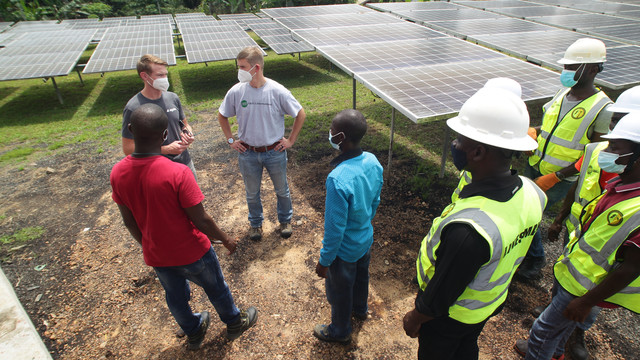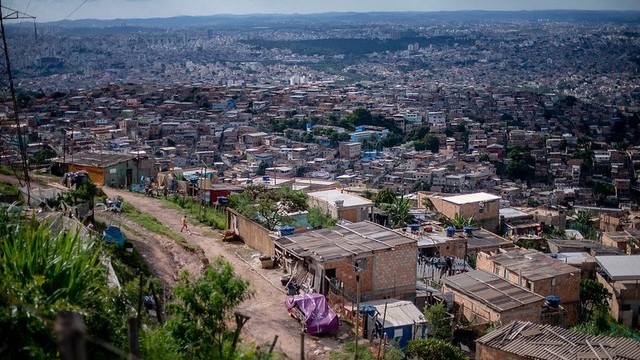Briefing: Will Habitat III produce an effective "new urban agenda?"
This discussion focused on the likely outcomes and impacts of this year's UN Conference on Housing and Sustainable Urban Development, Habitat III – plus the launch of the April issue of Environment & Urbanization.

Habitat III will be one of the first global United Nations conferences since the the 2015 meeting on the Sustainable Development Goals (SDGs) and the Paris climate change summit.
The stated aim of Habitat III is to agree a "new urban agenda" that will support the implementation of the SDGs in urban areas. Working groups have been drafting the agenda in preparation for formal agreement by governments at the global summit, which will convene in Quito, Ecuador in October 2016.
How 'new' will this agenda be? And how effective?
On Thursday, May 5, IIED hosted a discussion meeting that brought together four leading experts on urbanisation and development to look at at the prospects for, and potential outcomes of, Habitat III, one of the year's most important global summits.
Programme:
- What is inclusive urbanisation, why is it important, and how can it be achieved? With Gordon McGranahan, research fellow, cities, Institute of Development Studies
- Will the New Urban Agenda actually address gender equality? With Caroline Moser, emeritus professor, University of Manchester
- Can Habitat III produce a document that does influence government policies and practices? With David Satterthwaite, senior fellow, Human Settlements Group, IIED
- Latest news on the UN drafting process: With David Dodman, director, Human Settlements Group, IIED
Satterthwaite also introduced the latest issue of the journal Environment & Urbanization, which is titled "From the MDGs to the SDGs and Habitat III".
The issue features 19 articles examinining urban processes in light of MDG analysis, and proposals for the urban agenda moving forward – including implementation of Sustainable Development Goal 11, "Make cities inclusive, safe, resilient, and sustainable". Copies of Environment & Urbanization will be available for participants to take away.
About the speakers
Gordon McGranahan, research fellow, cities, Institute of Development Studies
Gordon McGranahan has more than three decades of experience working on urban issues. During the 1990s he led the urban environment programme at the Stockholm Environment Institute. From 2000 he worked at IIED, heading up the Human Settlements Group. His current research interests include the politics, economics and practicalities of: how urbanisation can contribute to economic productivity, social inclusion and environmental sustainability; how growing cities can accommodate their additional population more equitably; the challenges of sanitation in deprived urban settlements; the informal economy and, most recently; the dynamics of urban violence.
Caroline Moser, emeritus professor, University of Manchester
Caroline Moser is an urban social anthropologist/social policy specialist and emeritus professor at the University of Manchester, where until 2012 as Professor of Urban Development she directed the Global Urban Research Centre (GURC). Current appointments include research advisor to Ford Foundation’s just cities strategy; senior advisor to Canadian CIDA’s urban conflict and violence reduction research programme, member of the Swedish Research Council, Development Committee, and chair of the Board of Trustees of Children Change Children, a UK-based NGO that supports Colombian excluded youth-focused NGOs.
Prior to GURC she was a senior fellow at Brookings Institution, Washington D.C., and from 1990-2000 worked at the World Bank, first in the Urban Development Division, and then as lead specialist social development in the Latin American Department.
David Satterthwaite, senior fellow, Human Settlements Group, IIED, and editor, Environment and Urbanization
David Satterthwaite is a senior fellow at IIED and visiting professor at the Development Planning Unit, University College London. He was a co-ordinating lead author of the chapter on urban adaptation in the Fifth Assessment of the Intergovernmental Panel on Climate Change (IPCC) and he is currently working with other IPCC authors on a book on how cities can combine development and climate change adaptation and mitigation.
David Dodman, director, Human Settlements Group, IIED
David Dodman is an expert on climate change vulnerability and resilience in urban centres. His current work focuses on understanding the nature of urban risks, and the way in which daily hazards, major disasters and climate change can affect low-income urban residents. He works with local organisations, international agencies and universities to build the resilience in urban communities and cities. A member of the Habitat III policy unit on urban ecology and resilience, he has expertise in urban governance for adaptation, urban livelihoods in the context of climate change and community-based environmental management. His work has a particular focus on eastern and southern Africa and Southeast Asia.



